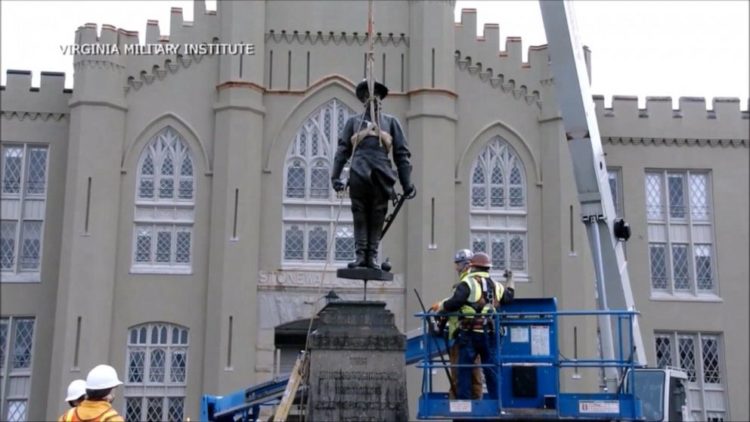Earlier this month, the Virginia Military Institute removed the statue of General “Stonewall” Jackson following allegations from black cadets of racism at the school.
The statue, sculpted by VMI graduate Moses Ezekiel and unveiled in 1912, has long been the spiritual centerpiece of the 181-year-old school. Jackson taught physics at VMI before fighting for the Confederacy during the Civil War. The status had enjoyed a prominent home in the middle of campus in front of the student barracks. Up until a few years ago, first-year cadets were required to salute the statue when they passed by.
VMI — the nation’s oldest state-supported military college — had long resisted calls to remove Jackson from his perch.
But in late October, the institution’s board voted to remove the Stonewall Jackson statue after The Washington Post reported on students’ allegations of an “atmosphere of hostility and cultural insensitivity” at the school.
The statue had been a focus of controversy for years. Still, the school had committed to keeping it in place as recently as July 2020, when VMI’s longtime superintendent Gen. J.H. Binford Peay III said written in a statement, “We cannot eliminate our history nor do we desire to do so. Instead, we desire to build upon our past and will do our part to continue to build a strong Institute.”

Kaleb Tucker graduated from the Virginia Military Institute in May. According to a recent article, “he can’t stop thinking about the indignities he endured as a black man on the campus of the country’s oldest state-supported military college.”
Tucker reported that it was saluting the statue that bothered him most. Despite doing away with the custom several years ago, the statue remained in place, even as other monuments of Confederate soldiers were being taken down in Virginia and elsewhere in the country.
After graduating, Tucker reportedly launched a Change.org petition requesting VMI to “acknowledge the racism and prejudice that still occurs at VMI” and to “tear down” the statue.
Stonewall Jackson is known to have been a slave owner. He is also one of the most well-known Confederate generals and even served in the U.S. Army during the Mexican-American War. Many military historians consider Jackson to be one of the most gifted tacticians in U.S. military history.
VMI’s longtime superintendent, retired Gen. J.H. Binford Peay III, was pressured to resign. Peay had defended Jackson’s statue, calling him a “military genius” and “staunch Christian.”
Already have an account? Sign In
Two ways to continue to read this article.
Subscribe
$1.99
every 4 weeks
- Unlimited access to all articles
- Support independent journalism
- Ad-free reading experience
Subscribe Now
Recurring Monthly. Cancel Anytime.
VMI, whose cadets had fought for the Confederacy at the Battle of New Market in 1864, now has its first-ever black leader, retired Army Maj. Gen. Cedric T. Wins, who is serving as interim superintendent following Peay’s resignation.
“VMI does not define itself by this statue, and that is why this move is appropriate,” Wins, a 1985 VMI graduate, said in a statement. “We are defined by our unique education system and the quality and character of the graduates the Institute produces. Our graduates embody the values of honor, respect, civility, self-discipline, and professionalism. This is how we will continue to be defined.”
The school said the statue would be relocated to the Virginia Museum of the Civil War at New Market Battlefield State Historical Park — owned and operated by the college — about 80 miles north of VMI’s campus in Lexington.
Lead Image: ABC News











COMMENTS